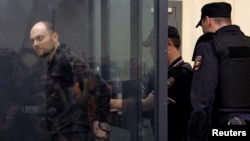This month marks the second anniversary of the jailing of Russian journalist and opposition activist Vladimir Kara-Murza. He was convicted of treason for denouncing the war in Ukraine and is serving a 25 year sentence.
At a recent gathering at the U.S. Capitol, Deputy Assistant Secretary of State for European and Eurasian Affairs Sonata Coulter recalled her meetings with Kara-Murza:
“I know firsthand he is impressive in his tireless commitment to seeking a brighter future for his country. As I reflect on the Kremlin's decision to arrest and convict him for peaceful expression, I am appalled. The Kremlin's denial of Vladimir's freedom only underscores the Russian political systems weaknesses.”
Kara-Murza recognized the risks he took in returning to Russia from the U.S. after calling Russian President Vladimir Putin a war criminal for invading Ukraine, said Deputy Secretary Coulter. “But [Kara-Murza] believed then, as he does now, in the justness of that choice, his commitment to speak boldly and truthfully about the rot within Russia's political system.”
“Even from prison and harsh conditions for crimes he did not commit, Vladimir continues to speak boldly in support of freedom and democracy. He speaks of a brighter future for Russia ... a Russia in which its citizens may take part in their constitutional rights, in meaningful participation in their government, in self-determination and in peace,” she said.
Deputy Secretary Coulter called Russia's internal repression and its external aggression “inextricably linked.”
“Vladimir's case. . .is sadly representative of the almost 700 political prisoners the Kremlin is estimated to currently hold. The Kremlin's reach and its transnational repression have surely affected many times that number. This chilling atmosphere reduces the space for free expression or peaceful dissent, contributing to a climate in which the Kremlin attempts to convince Russians and those around the world that the Kremlin's actions are justified or even popular.”
The United States will continue to raise Kara-Murza’s case with the Russian government at every opportunity. “We've sanctioned a number of those responsible for oppressing him and continue to sanction more,” said Deputy Secretary Coulter.
“As long as the Kremlin continues to punish those who speak for democratic values, we will speak up for these prisoners, and we will continue to do so until Russia takes up the brighter path that brave souls like Vladimir Kara-Murza campaigned for.”














